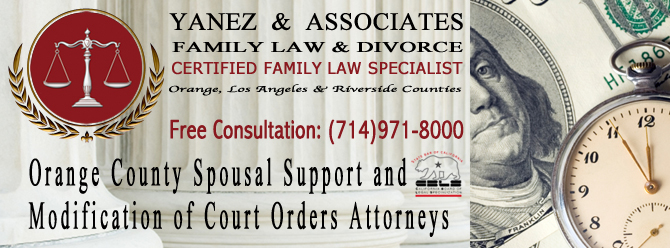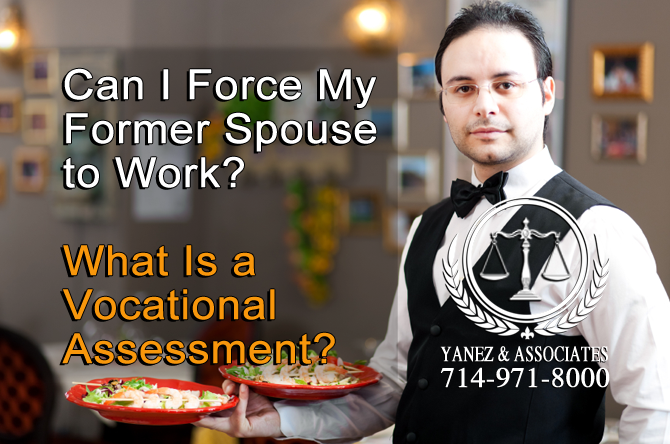Spousal Support FAQ: Will Spousal Support ever end in Orange County because my ex does not work?
Will Spousal Support ever end in Orange County if My Former Spouse or Partner Does Not Work?
Regardless of whether your spouse works, or does not want to work, spousal support is not meant to last forever in most cases. The idea behind spousal support is to allow both spouses to maintain the same standard of living that they had while they were married or in a registered domestic partnership.
In some spousal support orders, the terms will require that the recipient spouse is required to get the necessary training and education in order to obtain gainful employment, and failure to do so can result in termination of spousal support. However, this is not the case in every California spousal support order.
Spousal support orders are created depending on your unique situation. If spousal support is currently ongoing, the courts will have the power to modify or terminate the order at any time. In order to apply for a modification to your current spousal support order, you will usually need to show that a significant change in circumstances renders the modification necessary.
Can I Force My Former Spouse to Work? What Is a Vocational Assessment?
Technically, you cannot force your former spouse or partner to work and hold a job. However, you can have your spousal support agreement adjusted if they fail to and you can prove it.
You can get something called a ‘vocational assessment’, which will show that your former spouse or partner has not made a good faith effort to seek or find gainful employment within a reasonable period of time. Because many of the terms in that sentence can vary depending on your situation and the interpretation of your spousal support agreement by the judge, it is important to work with an attorney who understands how the law works in California.
If it is found that your former spouse or partner is not making a good faith effort to find employment that would supply them with income, the court may calculate the spousal support agreement based on what your former spouse or partner could or should be earning if he or she were putting in the necessary effort.
Earning capacity, or the income that a person has the ability to earn, is based on several factors, including a person’s age, health, education, employment history, and marketable skills combined with the current job market and available employment opportunities. If you wish to reduce or terminate a spousal support order based on your former spouse or partner’s earning capacity, it will be your burden to prove that he or she has the ability to earn more than he or she currently earns. You will need to show that your former spouse or partner has both the opportunity and the ability to earn more.
A vocational assessment or a vocational evaluation is a necessary review of your former spouse or partner’s current situation, skills, and the opportunities available to him or her. It may require an evaluation by a vocational evaluator - so you may need to hire a professional in addition to your attorney.
The Ten-Year Marriage Rule
Spousal support is usually not meant to last forever. Even what is sometimes called ‘permanent spousal support’ is really only ‘long term spousal support’. In California, the ten-year rule is not a legal term; it is simply an arbitrary divide that separates most marriages of long duration from marriages that are not of long duration. However, marriages that are shorter than ten years can also be considered marriages of long duration in some situations.
Long Marriages
When a marriage is considered to be one of long duration in California, the court retains jurisdiction over the spousal support order, which does not mean that the order is permanent. It simply means that an end to the order is not determined when it is put into effect; the termination of the order will be set at a later date.
This allows the couple’s circumstances to determine how spousal support will play out, and it means that it can be modified at any time, assuming there is a valid reason for the modification.
In the case of a long-term marriage, you may need to show that your former spouse has not made a good faith effort to find gainful employment in order to reduce or terminate the spousal support order. It may be easier if your spouse has also entered into a new relationship and is cohabitating with a new partner, or has remarried or entered into a new registered domestic partnership in California.
Short Marriages
Usually, when the marriage is not considered to be a marriage of long duration in California, spousal support is ordered for half of the length of the marriage. This means that following a six-year marriage; spousal support will likely be awarded for up to three years. This also means that the court will no longer have the authority to modify or extend the spousal support order once those three years have come to an end. If spousal support needs to be modified within those three years, the court has the authority to modify it by increasing or decreasing the amount, however, after the three years, spousal support will end.
In this case, you may not have much luck if your spouse refuses to work within those three years. However, following the end of the three year mark, you will usually not be required to pay spousal support, regardless of your former spouse or partner’s decision to work or not.
Determining Spousal Support in California
Under the California Family Code 4320, the Court in California determines both the duration and the amount of spousal support that will be owed under a spousal support order according to the following 12 factors.
- The court will consider the earning capacity of both parties, and the standard of living that was set during the marriage. If both spouse’s have the earning capacity to maintain that same standard of living, spousal support will not be necessary, or it will not be necessary long term.
- The court will consider if either party contributed to the earning capacity of the other party. This means that if one party helped the other with an education, training, career advancement, licensing, etc., they have contributed to that party’s earning capacity and may be eligible for more support because of that effort.
- The court will consider the ability of the supporting party to pay spousal support based on earning capacity, standard of living, and current assets as well as future income.
- The court will consider both parties’ needs based on the standard of living that was established during the marriage.
- The court will consider both the financial and personal obligations and the assets of both parties, including separate property and community property to be divided in divorce or legal separation.
- The court will consider the length of the marriage, and whether it was a short term or long term marriage.
- The court will consider both parties’ abilities to seek and find gainful employment while raising shared children that may be in the custody of either party. The custody and visitation order that goes into effect following a divorce in California will have an effect on this portion of spousal support.
- The court will consider factors about the individuals in each party, including age, health, stress level, and the effects of domestic violence on the children and the receiving party, especially when the violence was at the hands of the supporting party.
- The court will consider the tax consequences of paying and receiving spousal support on both parties.
- The court will consider the hardships faced by both parties.
- The court will consider the ultimate goal of two self-sustaining parties, neither of which depends on the other financially. In cases where a marriage is considered to be one of long duration, support will last for a longer period of time, and may be indefinite. However, in marriages that are of short duration, spousal support is generally no more than half the length of the marriage. In both cases, spousal support should be specific to each unique situation.
- The court may also consider various other factors that it considers necessary and pertinent to the situation.
Remember to always consult with legal counsel regarding your spousal support order - it can make a world of difference when it comes to protecting your best interests while still following the law. The ten-year rule is infinitely more important in marriages of long duration, but it can affect marriages of any length depending on your situation.
Orange County Spousal Support and Modification of Court Orders Attorneys

For a FREE case review with an Orange County Spousal Support and Modification of Court Order Attorney contact us now.
If you believe that your spousal support order should be modified or terminated because your former spouse refuses to work, you may have a case. However, the specifics of your unique situation can affect whether or not the court is likely to grant your modification. It is always best to discuss your case with an attorney - contact the lawyers at Yanez & Associates today to schedule your free initial consultation.















